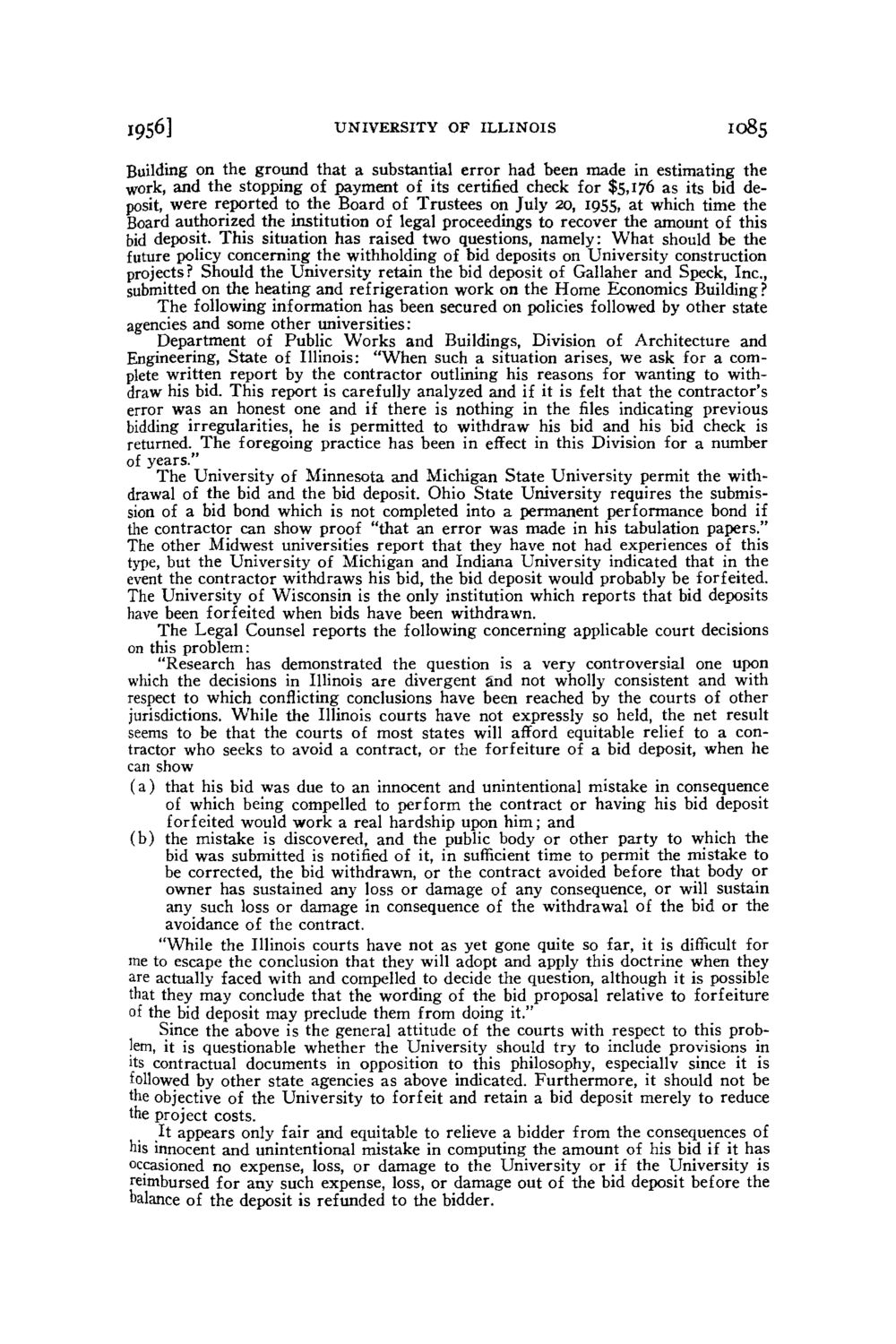| |
| |
Caption: Board of Trustees Minutes - 1956
This is a reduced-resolution page image for fast online browsing.

EXTRACTED TEXT FROM PAGE:
1956] UNIVERSITY OF ILLINOIS IO85 Building on the ground that a substantial error had been made in estimating the work, and the stopping of payment of its certified check for $5,176 as its bid deposit, were reported to the Board of Trustees on July 20, 1955, at which time the Board authorized the institution of legal proceedings to recover the amount of this bid deposit. This situation has raised two questions, namely: What should be the future policy concerning the withholding of bid deposits on University construction projects? Should the University retain the bid deposit of Gallaher and Speck, Inc., submitted on the heating and refrigeration work on the Home Economics Building? The following information has been secured on policies followed by other state agencies and some other universities: Department of Public Works and Buildings, Division of Architecture and Engineering, State of Illinois: "When such a situation arises, we ask for a complete written report by the contractor outlining his reasons for wanting to withdraw his bid. This report is carefully analyzed and if it is felt that the contractor's error was an honest one and if there is nothing in the files indicating previous bidding irregularities, he is permitted to withdraw his bid and his bid check is returned. The foregoing practice has been in effect in this Division for a number of years." The University of Minnesota and Michigan State University permit the withdrawal of the bid and the bid deposit. Ohio State University requires the submission of a bid bond which is not completed into a permanent performance bond if the contractor can show proof "that an error was made in his tabulation papers." The other Midwest universities report that they have not had experiences of this type, but the University of Michigan and Indiana University indicated that in the event the contractor withdraws his bid, the bid deposit would probably be forfeited. The University of Wisconsin is the only institution which reports that bid deposits have been forfeited when bids have been withdrawn. The Legal Counsel reports the following concerning applicable court decisions on this problem: "Research has demonstrated the question is a very controversial one upon which the decisions in Illinois are divergent and not wholly consistent and with respect to which conflicting conclusions have been reached by the courts of other jurisdictions. While the Illinois courts have not expressly so held, the net result seems to be that the courts of most states will afford equitable relief to a contractor who seeks to avoid a contract, or the forfeiture of a bid deposit, when he can show ( a ) that his bid was due to an innocent and unintentional mistake in consequence of which being compelled to perform the contract or having his bid deposit forfeited would work a real hardship upon him; and (b) the mistake is discovered, and the public body or other party to which the bid was submitted is notified of it, in sufficient time to permit the mistake to be corrected, the bid withdrawn, or the contract avoided before that body or owner has sustained any loss or damage of any consequence, or will sustain any such loss or damage in consequence of the withdrawal of the bid or the avoidance of the contract. "While the Illinois courts have not as yet gone quite so far, it is difficult for me to escape the conclusion that they will adopt and apply this doctrine when they are actually faced with and compelled to decide the question, although it is possible that they may conclude that the wording of the bid proposal relative to forfeiture of the bid deposit may preclude them from doing it." Since the above is the general attitude of the courts with respect to this problem, it is questionable whether the University should try to include provisions in its contractual documents in opposition to this philosophy, especially since it is followed by other state agencies as above indicated. Furthermore, it should not be the objective of the University to forfeit and retain a bid deposit merely to reduce the project costs. It appears only fair and equitable to relieve a bidder from the consequences of his innocent and unintentional mistake in computing the amount of his bid if it has occasioned no expense, loss, or damage to the University or if the University is reimbursed for any such expense, loss, or damage out of the bid deposit before the balance of the deposit is refunded to the bidder.
| |